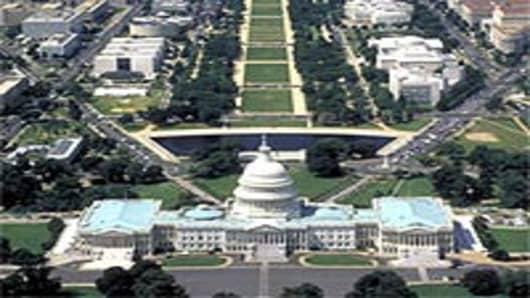Despite all the worry about the sluggish US economy, businesses and investors are finding an even bigger reason to be cautious these days: the political mess in Washington.
"Businesses—especially smaller businesses, independent businesses—they don't know what their cost structures are going to be because of government-imposed changes," David Kotok, founder of Cumberland Advisors, said on CNBC this week. "Half the US economy's holding back because of this great uncertainty that's coming from Washington."
Investors, too, are holding back, with control of Congress up for grabs in November and the possibility of sharp policy changes after that. Market pros cite a number of issues—the Bush tax cuts, possible repeal of health care reform, the deficit—for all the unease.
The market, in fact, has basically moved sideways all summer, with the Standard & Poor's 500 virtually unchanged since May 25. Investors, meanwhile, have fled equity funds and plowed money into bonds.
"Why are we stuck in this range? It’s not the (economic growth) issue," says Nadav Baum, executive vice president at BPU Investment Management in Pittsburgh. "It’s the issue of what’s going to happen in November with the election and what’s going to happen with the Bush tax cuts. You’ve got all this uncertainty and…when there’s more uncertainty, people get more uncomfortable with equities."
Some pros, like Keith Springer, president of Capital Financial Advisory Services, think investors would be just fine with the kind of legislative gridlock that gripped Washington in the mid-1990s, when then-President Bill Clinton battled with a Republican-controlled Congress.
In fact, Springer predicts a strong rally if the Republicans manage to take control of at least one congressional chamber after the November election.
"There's a push-pull in the market right now where nobody wants to go through the pain of what we need to get the economy back in shape," he said. "But at the same time nobody wants to stop spending money to make it better."
Investors like gridlock in Washington partly because it removes the possibility of major changes being made that could rattle the landscape.
When the GOP wrested control from the Democrats in the 1994 mid-term elections, the previously moribund S&P 500 gained 34 percent in 1995, another 20 percent in 1996, 31 percent in 1997, 27 percent in 1998 and 19.5 percent in 1999 before hitting a wall in 2000.
"Gridlock would probably make this market soar," Springer says.
In the interim, investors have been trying to outfox the market, employing a buy-the-dips sell-the-rallies stock strategy and going full-bore into bonds.
Many investors have been looking to the Federal Reserve for direction, trying to stay ahead of the central bank as it continues measures, such as buying Treasurys, to boost money flow in the economy, says Kotok of Cumberland Advisors.
"The Fed does not do these trades in isolation," Kotok said in a note to clients earlier this week. "The rest of the world is watching, trading, investing, swapping, hedging, and attempting to front-run the Fed's tsunami every single minute."
Could Fed Enter the Stock Market?
One economist predicts the Fed could go as far as buying stocks and real estate to boost the flagging economy.
Michael Pento, senior economist at Euro Pacific Capital in New York, envisions a scenario in which the Fed, desperate to get money into consumers' pockets, starts buying S&P 500 stocks and real estate in an effort to boost asset prices.
The Fed so far has indicated only a switch from mortgage-backed securities into Treasurys, a move aimed at driving interest rates even lower and facilitating the flow of credit, even though low loan demand has largely thwarted the effect of the drop so far in lending rates.
"What is the real difference?" Pento says. "In one instance they're trying to bring down borrowing costs. Maybe if they buy stocks they'll really put a dagger in the heart of deflation. People will see asset prices rise. They'll start spending money."
Pento says "I hope and pray" the Fed does not take that approach, but wouldn't be surprised given that the central bank and Chairman Ben Bernanke "are not limited to purchasing assets from banks but can direct their purchases directly at the consumer in an unlimited fashion."
At least one Fed expert sees such a scenario as unlikely. The only other time a global central bank bought stocks was in the 1997-98 Asian debt crisis when Hong Kong's monetary authority got in the equities business.
"The biggest part of the problem is not monetary. It's not a problem that central banks can solve," says Allan Meltzer, a Carnegie Mellon professor and one of the country's foremost historians on the Fed. "They're certainly not going to be buying real estate."
Meltzer says that even the 2010 election may not cure Wall Street apathy, which he thinks could persist until the 2012 presidential election.
"We'll have two years of stalemate is probably the most likely outcome (this year)...unless the president wants to move to the center the way Bill Clinton did," he says. "This president doesn't seem likely to do that, but politicians surprise you."
Indeed, there are some who think the economy is beyond political help.
"The problems of the economy transcend politics altogether," says Walter Zimmerman, chief strategist at United-ICAP in New York. "It transcends ideology, taxation policy, whether we have a (national) health care system or not."
"What panacea do investors see arising on the scene from a Republican takeover of the House? We're already on an unsustainable course." adds the libertarian Pento. "It's going to be gridlock, which is better than what we have now. But do I think it's going so solve all our problems? Absolutely not."




